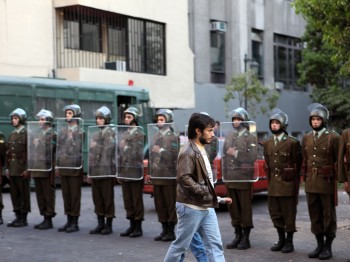By: debbie lynn elias
With Oscar voting opening up shortly for Academy members, of whom many of my readers are, let’s shed a little light on a Best Foreign Language Film Oscar nominee vying for the little golden statuette on February 24th – from Chile, it’s NO.
Written by Pedro Peirano, directed by Pablo Larrain and starring Gael Garcia Bernal, NO is a fictional, albeit rather authentic, look at 1988 Chile, and specifically, a plebiscite on the presidency of Augusto Pinochet, with the country voting “SI” or “NO” to a continuation as president by Pinochet for another eight years. With some of the greatest pressure for the referendum coming from the United States, one of Chile’s staunchest allies, Pinochet had been in power for 15 years with a regime that became synonymous with murder, imprisonments, disappearances of individuals, exiles and disregard for human rights. It had reached a point where 16 political parties within Chile were opposed to Pinochet continuing his reign.

Although many believe the campaign to be a “formality”, the NO faction has every hope in the world that Pinochet can be defeated and calls on Rene Saavedra (an amalgamation of Jose Manuel Salcedo and Enrique Garcia, the two ad men who actually designed the NO campaign), a young, hip, advertising executive, to design and run the NO campaign. With 15 minute television ads required to run everyday for 3 weeks leading up to the vote, Saavedra develops a novel approach. Rather than show the heinous, hard-hitting negativity of what is wrong with the country under Pinochet’s rule, campaign against type with the belief that “Everyone wants to be happy. Happiness will be the campaign.” And so “Happiness is coming if you vote NO!” became the anthem of the NO campaign. With smart, slick, American advertising with a 70’s Coca Cola “We’d like to teach the world to sing” look and feel to it, the NO campaign even boasts plugs from Jane Fonda, Richard Dreyfuss and Christopher Reeve. Adding interest to the campaign is Saavedra’s boss who happens to serve on Pinochet’s advisory board and is handling the “SI” campaign.
It’s no spoiler to tell you what history already knows – 97% of the registered voters turned out at the polls and the NO campaign won almost 56% of the vote.
Side drama unfolds through Veronica, Saavedra’s estranged wife and mother to his young son. A radical activist, Veronica spends her time getting arrested, insisting the referendum a fraud and putting down Saavedra not only for his advertising job, but his involvement in spearheading the NO campaign.
From an historical and political standpoint and particularly the overthrow of the dictatorial Pinochet in a fair election without coups or jihadist type actions, NO is quite interesting (not as interesting as fellow Oscar contender and riveting documentary, The Gatekeepers, but interesting nonetheless). But perhaps the most interesting aspect of NO is the marketing and advertising campaigns mounted and the importance of ad men in the political system, especially in a country like Chile in 1988.

The individual personal story of Rene Saavedra is what buoys the film, even moreso than the political tactics of the Pinochet “SI” driven campaign. As Saavedra, Gael Garcia Bernal makes a compelling and sympathetic, yet tacit, participant to history, while exuding a great observational quality. It’s a wonderful character study and quiet thoughtful performance by Bernal.
Alfredo Castro easily slides into the role of Lucho Guzman, Saavedra’s boss and head of the “SI” campaign. Oozing distrust, Castro tacitly sets the stage for unspoken tension between Guzman and Saavedra. Antonia Zegers delivers and annoying unlikeable Veronica, making one question why Saavedra would have ever been attracted to her in the first place.

Thanks to a vintage 1983 U-matic video camera, director Pablo Larrain together with his cinematographer Sergio Armstrong, provide authentic lensing that at times look like a poor man’s 1970’s tv movie, at times like a student film, and at times like surreptitious surveillance. Hand-held, convoluted immersion at best, and lending to a “third world” interpretation of Chile which I believe to be a misnomer, the look not only lends itself to the time and foreign world, but the present day U-matic video blends perfectly with the grainy resolution of actual news footage from 24 years ago which is liberally interspersed throughout the film. And speaking of the newsreel footage – perfection. From archival newsreels to the actual tv spots and ads to Chilean tv news broadcasts – PERFECTION. It only adds to the authenticity and historical reference, as well as providing a timeless period perfect quality. Going hand in hand with the cinematography and tonal bandwidth of the film as a whole is Estefania Larrain’s production design, right down to product placement (Phillips, Sony, a vintage microwave) and period perfect clothing, much of which has a 70’s feel to it which, in truth and in fact, was being worn in Chile and other Latin American countries at that time.
A big drawback to the production, however, is the tiresome and incessant repetition of the advertising jingle and campaign slogan. Makes for a tedious experience that detracts from the significance of history.
While an informative film of a minuscule chapter in Latin American history, Chile and the reign of Pinochet, I believe NO would benefit with some more historical bookending on Pinochet. But at the end of the day, while I say “SI” to NO for its historical significance and as a light into Chile and infiltration of “American” advertising techniques, I have to say NO to NO for Oscar gold.
Directed by Pablo Larrain
Written by Pedro Peirano
Cast: Gael Garcia Bernal, Alfredo Castro, Antonia Zegers
(In Spanish with English subtitles.)











